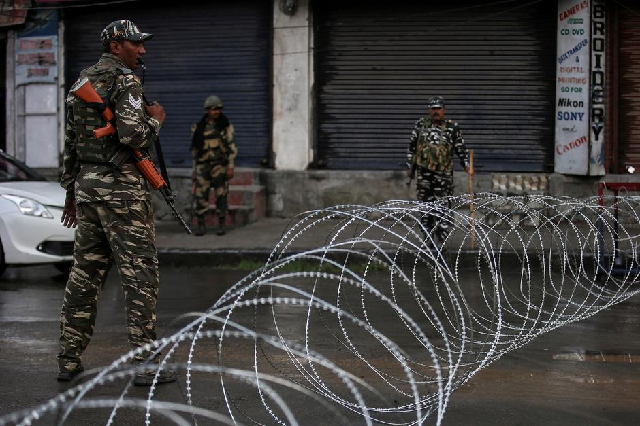100 days of lockdown
Several Muslim states have also held back from overtly criticising India due to economic, security considerations

PHOTO: Reuters
Despite appeals from many corners of the world to roll back the latest oppressive measures and avoid further tarnishing its claim to being the world’s largest democracy, India continues on its ride into the depths of fascism. The reign of terror continues unhindered largely because of the silence of the world’s most influential states. Of the five permanent members of the United Nations Security Council, only one - China - has raised any significant noise about India’s actions in Kashmir. The three western democracies on the UNSC - the United States, France and Great Britain - have let economic considerations and domestic politics outweigh any worries about the human rights that they claim to hold so dear.
A large number of Muslim states have also held back from overtly criticising India due to economic or security considerations. Even though some international organisations and influential countries such as Germany and Turkey have been louder in their criticism of India’s latest Kashmir crackdown, without the world on one page, India is unlikely to significantly roll back its oppressive practices any more than it did a few weeks back, when it allowed a hand-picked group of right-wing members of the European Parliament with no foreign policy credentials to go on boat rides in the disputed state.
And yet, there are still signs of hope, because, in spite of the lack of tangible intervention by the international community on behalf of the Kashmiri people, more and more people in India seem convinced that Prime Minister Narendra Modi and the Bharatiya Janata Party’s recent actions are a bridge too far for them. The Maharashtra elections show that despite all of Modi’s recent ‘grand’ actions in Kashmir and elsewhere, the BJP actually lost seats, as did its allied extremist parties.
But we must be realistic. When fascist governments begin losing at the ballot box, they resort to other means to maintain power. Today, dissent in India is being punished using threats of violence and outright mob lynchings, and at the ‘formal level’ through ludicrous means such as the revocation of nationality. The current Indian government has shown that there is a higher likelihood of Kashmir-like crackdowns spreading nationwide than there is of the situation improving, more so because those with the platform to speak truth to power have themselves bitten off too much of the forbidden fruit. Even respected Indian journalists no longer seem to know the difference between Modi and the Republic of India — critique of the former is translated as being a critique of the latter, even if no such inferences were made.
So how then can the conditions in India-Occupied Kashmiri (IOK) be improved? Get the world to pay attention, not only to what is going on now, but what has been going on for over 70 years. If Kashmiris were allowed to govern themselves, maybe they would stop using pebbles to ‘terrorise’ the heavily-armed Indian security forces. Gilgit-Baltistan and Azad Jammu and Kashmir may not be the best-governed places in the world, but compared to IOK, they are a paradise. Show the world.
Published in The Express Tribune, November 13th, 2019.
Like Opinion & Editorial on Facebook, follow @ETOpEd on Twitter to receive all updates on all our daily pieces.















COMMENTS
Comments are moderated and generally will be posted if they are on-topic and not abusive.
For more information, please see our Comments FAQ